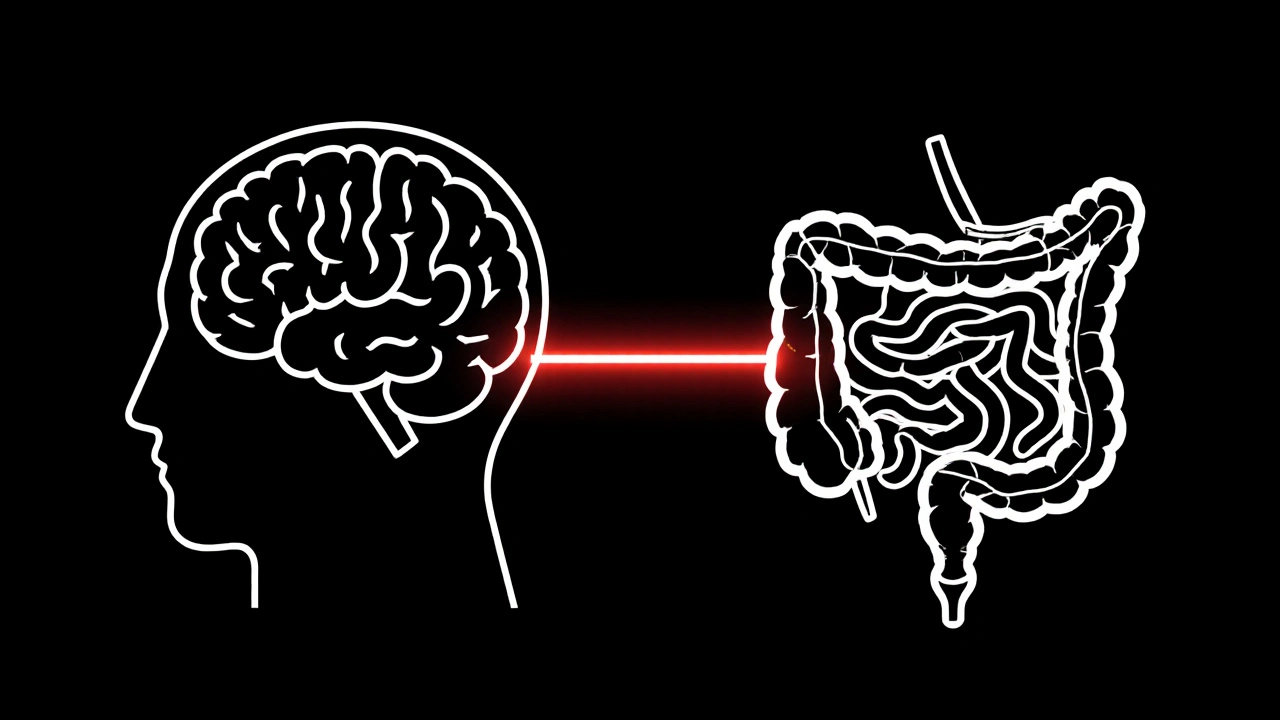 Oct, 15 2025
Oct, 15 2025
Anxiety & Stomach Symptom Tracker
Track Your Symptoms
Your Symptom Pattern
Key Takeaways
- The gut and brain talk to each other through the gut‑brain axis.
- Stress hormones like cortisol can slow stomach emptying, creating nausea, bloating, and cramps.
- An overactive gut can produce more serotonin, which may amplify anxious thoughts.
- Simple lifestyle tweaks (mindful eating, relaxation drills, probiotic foods) often calm both the mind and the belly.
- Seek a health professional if symptoms persist, worsen, or are accompanied by weight loss, blood in stool, or severe pain.
Ever felt a knot in your stomach right before a big presentation? Or noticed that after a panic attack your belly is bloated for hours? That’s not a coincidence. Your digestive tract and your nervous system share a two‑way street called the gut‑brain axis is a bi‑directional communication network linking the gastrointestinal (GI) system with the central nervous system. Understanding how this highway works can help you untangle the loop where an upset stomach fuels anxiety and anxiety fuels an upset stomach.
What the Gut‑Brain Axis Actually Is
The gut‑brain axis is a network of nerves, hormones, and immune signals that lets the brain and gut exchange information in real time. The main highway is the vagus nerve is the longest cranial nerve, transmitting sensory data from the gut to the brain and motor commands back. Alongside neural pathways, chemicals like serotonin is a neurotransmitter that regulates mood, appetite, and GI motility, with about 90% made in the gut and stress hormones such as cortisol is the primary stress hormone released by the adrenal glands, influencing blood sugar and immune response swirl through this system. The collection of trillions of microbes - the microbiome is the community of bacteria, fungi, and viruses living in the gut that influence digestion, immunity, and neurotransmitter production - also talks to the brain by releasing metabolites that can raise or lower anxiety.
Why Anxiety Can Trigger an Upset Stomach
When you’re stressed, your brain hits the “fight‑or‑flight” button. That sends a surge of cortisol is the primary stress hormone… and adrenaline into the bloodstream. This hormone cascade does three things that directly affect digestion:
- Slows gastric emptying. The stomach holds food longer, leading to bloating, nausea, and that “butterflies” feeling.
- Increases gut permeability. Known as “leaky gut,” it lets bacterial fragments leak into circulation, sparking low‑grade inflammation is the body’s immune response that can amplify both physical pain and emotional distress that worsens anxiety.
- Alters the microbiome. Stress hormones change the balance of good vs. bad bacteria, reducing the production of short‑chain fatty acids that calm the nervous system.
Result? You might experience cramps, acid reflux, or diarrhea shortly after a stressful meeting, even if the food you ate was perfectly fine.
How an Upset Stomach Can Feed Anxiety
The loop works in reverse, too. When the gut is irritated, it sends distress signals up the vagus nerve is the longest cranial nerve…. Those signals can trigger the brain’s threat‑detection center, the amygdala, making you feel on edge.
Additionally, the gut produces most of the body’s serotonin is a neurotransmitter that regulates mood…. If an ulcer, IBS, or food intolerance disrupts serotonin release, mood swings and heightened anxiety often follow. Inflammation from chronic indigestion can also raise levels of cytokines, molecules that have been linked to depressive and anxious symptoms.

Common Signs That Stress Is Behind Your Stomach Problems
- Sudden onset of nausea or “butterflies” before a known stressor (exam, interview, public speaking).
- Recurring bloating or gas that improves after relaxation techniques.
- Diarrhea or constipation that appears with mood swings.
- Heartburn that worsens on nights with poor sleep or high anxiety.
- Feeling of fullness even after eating a small meal.
If you notice these patterns, it’s a strong hint that your brain and gut are talking louder than they should.
Practical Steps to Break the Cycle
Below are evidence‑based habits that calm both the mind and the digestive tract. Pick three to start and add more as they become routine.
- Mindful breathing. Six‑breath diaphragmatic cycles (inhale 4seconds, pause 2, exhale 6) lower cortisol within minutes. Do it before meals.
- Eat a gut‑friendly breakfast. Yogurt, kefir, or a small serving of oats with chia seeds supplies probiotics and fiber that support the microbiome is the community of bacteria….
- Limit caffeine and alcohol. Both amplify stress hormones and irritate the stomach lining.
- Schedule regular movement. A 20‑minute walk after eating stimulates the vagus nerve, promoting gastric emptying.
- Try a gentle probiotic. Strains like Lactobacillusrhamnosus and Bifidobacteriuminfantis have been shown to reduce anxiety scores in clinical trials.
- Identify trigger foods. Keep a simple diary: note what you ate, stress level (1‑10), and any gut symptoms. Patterns emerge quickly.
- Practice progressive muscle relaxation. Tensing and releasing each muscle group for a few seconds reduces overall sympathetic activation, easing both anxiety and cramping.
When to Call a Professional
Most occasional stomach‑anxiety loops are manageable with lifestyle tweaks, but you should see a doctor if you experience any of the following:
- Persistent pain that doesn’t improve after a week of self‑care.
- Unexplained weight loss of more than 5% of body weight.
- Blood in vomit or stool.
- Severe vomiting that leads to dehydration.
- Symptoms lasting longer than three months, which may indicate IBS, GERD, or a hormonal disorder.
Healthcare providers may order tests such as a stool microbiome analysis, cortisol level check, or an upper endoscopy to rule out structural issues.

Comparison: Anxiety‑Related Stomach Symptoms vs. Other Digestive Issues
| Feature | Stress‑Related (Anxiety) | Typical GI Disorders (e.g., IBS, GERD) |
|---|---|---|
| Onset timing | Immediately after a known stressor | Gradual, often unrelated to events |
| Response to relaxation | Symptoms improve quickly with breathing or meditation | Little change unless treatment is medical |
| Typical symptoms | Nausea, mild bloating, “butterflies”, occasional diarrhea | Chronic abdominal pain, constipation/diarrhea, heartburn |
| Associated lab findings | Elevated cortisol, normal imaging | Altered gut motility tests, possible inflammation markers |
Bottom Line
The relationship between an upset stomach and anxiety isn’t mystical - it’s a real, bi‑directional conversation driven by nerves, hormones, and microbes. By calming your nervous system, you give your gut a break; by soothing your gut, you take some pressure off the brain. Small, consistent habits can tip the balance toward comfort on both ends.
Frequently Asked Questions
Can anxiety cause permanent damage to the stomach?
Short‑term stress usually leads to temporary irritation, not lasting harm. However, chronic anxiety can contribute to conditions like gastritis or ulcer formation, especially when combined with other risk factors such as NSAID use or Helicobacter pylori infection.
Is it true that most serotonin is made in the gut?
Yes. Roughly 90% of the body’s serotonin is synthesized by enterochromaffin cells in the gastrointestinal lining. This serotonin primarily regulates gut motility, but it also communicates with the brain via the vagus nerve.
How quickly can relaxation techniques lower cortisol?
Studies show that a single 5‑minute diaphragmatic breathing session can cut cortisol levels by up to 20% within 15 minutes. Repeating the practice before meals yields cumulative benefits.
Should I take probiotic supplements for anxiety?
Certain strains, especially Lactobacillusrhamnosus and Bifidobacteriumlongum, have demonstrated modest anxiety‑reducing effects in clinical trials. It’s best to choose a product with at least 10billion CFUs and to discuss it with your clinician, especially if you have an underlying health condition.
When is it necessary to get a medical test for my stomach pain?
If pain is severe, persists for more than a week, is accompanied by weight loss, blood, or vomiting, you should schedule a medical evaluation. Tests may include blood panels, stool analysis, ultrasound, or endoscopy depending on the suspected cause.
Bruce Heintz
October 15, 2025 AT 12:49Hey everyone, great post! It’s amazing how just a few minutes of mindful breathing before a big meeting can calm both the mind and the gut 😊. Try swapping out that extra cup of coffee for a short walk after lunch – you’ll notice less bloating and steadier nerves. Keep experimenting, and let us know what works best for you! 🙌
richard king
October 20, 2025 AT 23:29Behold, the tempestuous dance of nerves and intestines, a swirling vortex of cortisol‑laden fire that devours calm like a voracious dragon. When the mind screams “danger,” the gut answers with a chorus of gurgles, a symphony of dissent that reverberates through the very soul. This cruel reciprocity is not merely biology; it is the poetry of panic, inked in serotonin and spilled upon the parchment of our stomachs. Thus, dear readers, we stand at the crossroads of anguish and digestion, each step a tableau of trembling flesh and trembling thoughts.
Dalton Hackett
October 26, 2025 AT 09:09First, let me acknowledge that the gut‑brain axis is a remarkably intricate system that many people oversimplify in casual conversation. The vagus nerve, for example, serves as a bidirectional superhighway, transmitting sensory data from the gastrointestinal tract up to the cerebral cortex, and vice‑versa. When stress hormones such as cortisol surge, they can slow gastric emptying, leading to that familiar sense of “butterflies” one feels before a presentation. This slowing effect also allows for increased fermentation of food, which can produce excess gas and bloating. Moreover, chronic stress can alter the composition of the microbiome, favouring pathogenic bacteria over beneficial strains, and this dysbiosis can further exacerbate inflammation. Inflammation, in turn, increases permeability of the intestinal lining, a condition often called leaky gut, letting bacterial fragments enter the bloodstream. Those fragments trigger the immune system, releasing cytokines that can affect mood and cognition. The serotonin produced in the gut does not stay confined there; a portion travels via the bloodstream to the brain, influencing mood regulation. It is also worth noting that only about ten percent of the brain’s serotonin is synthesized in the central nervous system, the rest being gut‑derived, which underscores the importance of intestinal health. Dietary choices such as high‑sugar meals can feed harmful bacteria, amplifying cortisol’s impact. Conversely, a diet rich in fiber supports short‑chain fatty‑acid production, which has neuroprotective properties. Regular physical activity stimulates peristalsis, helping to move food along and reducing the feeling of fullness that can be mistaken for anxiety. Mindful breathing techniques have been shown in studies to reduce cortisol levels by up to twenty percent within minutes, providing immediate relief. Probiotic supplementation, particularly strains like Lactobacillus rhamnosus, has demonstrated modest reductions in anxiety scores in clinical trials. Finally, if symptoms persist beyond a few weeks, seeking medical evaluation is prudent to rule out underlying conditions such as IBS or GERD. In summary, by addressing both the mental and the mechanical facets of this loop, one can achieve a more harmonious balance between brain and belly.
William Lawrence
October 31, 2025 AT 19:49Oh sure, because everyone’s stomach just loves a good panic attack.
Grace Shaw
November 6, 2025 AT 06:29Dear community, let us consider the empirical evidence presented herein with the utmost seriousness. The correlation between heightened cortisol levels and delayed gastric emptying has been substantiated through numerous peer‑reviewed studies, thereby establishing a causal pathway that is not merely anecdotal. It is incumbent upon us, as informed individuals, to implement the recommended lifestyle modifications-namely, structured breathing exercises, probiotic intake, and regular physical activity-with diligence and consistency. Failure to address these factors may result in the chronic manifestation of dyspeptic symptoms, which in turn can precipitate a deleterious feedback loop exacerbating anxiety disorders. Accordingly, I implore each reader to adopt a systematic approach, recording dietary intake alongside stress metrics, to identify personal triggers with precision. Such methodical self‑monitoring will facilitate targeted interventions, thereby mitigating both somatic and psychological distress. It is through this disciplined application of scientific principles that one may attain the desired equilibrium between the enteric and central nervous systems.
Sean Powell
November 11, 2025 AT 17:09Yo folks! this post is like a map for the gut‑brain maze
try the probiotic smoothie it woks wonders for the mood & bloating
keep it chill and dont stress over the small stuff
Henry Clay
November 17, 2025 AT 03:49People need to stop glorifying hustle culture it’s plainly toxic for both brain and gut 😠 stress is a choice if you keep feeding yourself anxiety you’re complicit in your own suffering 🙂
Isha Khullar
November 22, 2025 AT 14:29In the quiet corridors of the mind the stomach roars like a wounded beast it is a tragic symphony of fear and ache that i cant ignore the very essence of our being is torn asunder by this relentless tide
Lila Tyas
November 28, 2025 AT 01:09Wow, this is super helpful! I love that you can actually feel the “butterflies” disappear after a quick breathing session. 🎉 Give the probiotic yogurt a try tomorrow and see how your gut vibes change!
Mark Szwarc
December 3, 2025 AT 11:49Great overview! A few practical tips: first, try a 4‑7‑8 breathing pattern for two minutes before meals – it has been shown to reduce cortisol spikes. Second, incorporate fermented foods like kefir or sauerkraut into your daily diet; they provide live cultures that support a balanced microbiome. Third, track your stress levels on a simple 1‑10 scale alongside food intake in a notebook or app; patterns often emerge that point to specific trigger foods. If symptoms persist after four weeks, consider seeing a gastroenterologist for possible testing such as a stool microbiome analysis. These steps should give you a solid foundation for breaking the anxiety‑stomach cycle.
BLAKE LUND
December 8, 2025 AT 22:29Honestly, if you’ve never tried a simple walk after dinner, you’re missing out on nature’s own reset button. It’s like giving your gut a gentle high‑five.
Veronica Rodriguez
December 14, 2025 AT 09:09Thanks for sharing! 🙏 I’ve found that sipping ginger tea before bed helps calm my nerves and reduces late‑night reflux. Give it a try and let us know how it works for you! 😊
Holly Hayes
December 19, 2025 AT 19:49One must, of course, recognize that the quotidian discomfort of indigestion is merely a manifestation of our society’s relentless pursuit of the superficial. Such pettiness is, frankly, beneath the intellectual discourse we should be engaging in.
Matthew Shapiro
December 25, 2025 AT 06:29The article does a solid job linking stress hormones to gut motility, though I’d add that individual variations in vagal tone can modulate this effect. It’s worth exploring personalized approaches rather than a one‑size‑fits‑all regimen.
Julia Phillips
December 30, 2025 AT 17:09Reading this felt like a warm hand on my shoulder during a storm; the description of the gut‑brain dialogue resonated deeply with my own experiences of anxiety‑induced nausea. Thank you for shedding light on this hidden conversation.
Rory Martin
January 5, 2026 AT 03:49It is evident that mainstream medicine conceals the true extent of the gut‑brain interconnection, preferring to promote pharmaceutical solutions over natural interventions. The information presented here hints at a larger agenda to keep the public dependent on synthetic drugs, while the real remedy lies in holistic practices that are purposefully suppressed.
Maddie Wagner
January 10, 2026 AT 14:29Friends, let’s rally together and experiment with these techniques-breathing, probiotics, mindful eating. The journey may be challenging, but the reward of a calmer mind and a settled stomach is worth every effort. Share your successes, and we’ll lift each other up!
Boston Farm to School
January 16, 2026 AT 01:09Interesting points Mark, especially the breathing exercise. I wonder how many people actually stick to the routine longer than a week 🙂